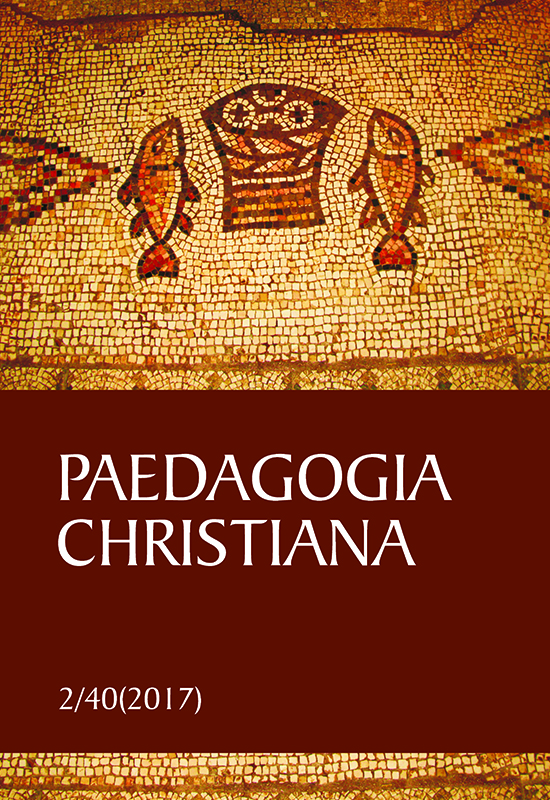Religion in Forming Adulthood. The Catholic Perspective
DOI:
https://doi.org/10.12775/PCh.2017.031Keywords
religious education of adults, religious knowledge, life competences, strategies of reflection upon life, lifestylesAbstract
Looking for the role of religion in forming adulthood is expressed in discovering factors fostering the development of a person. Amid them, religion is more and more often mentioned, as it fulfills the need of finding the source and sense of existence and acting. In Christianity, this final point of reference is personal God, who in Jesus Christ realizes the intention of humanity salvation. This means that Christian religion has the individual and communal shape that is transferred on its social impact dimensions and in each of them it has own way of realizing in the faith. The individual dimension is connected with the dynamism of the faith confessed and described in a concept of religious development, or the development of faith. The social dimension is seen in the references to other people in the shape of interpersonal relationships and in the references to social groups and institutions. Analysis of the research material gathered among the students of Biblical Correspondence Course (narrations of graduates, demographic data of participants and statistical calculations) depicts that there is the need for religious education among grown-up, which providing the true knowledge will support particular persons and groups in building the life style.
References
Bronk, Andrzej. „Religia”. W: Religia. Encyklopedia PWN na CD. Warszawa: PWN, 2001/2003.
Chaim, Władysław. „Koncepcje rozwoju religijnego”. W: Studia z psychologii rozwoju, red. Józef Makselon, 9–53. Kraków: Wydawnictwo Naukowe PAT, 2002.
Cross, K. Patricia. Adults as Learnes. Increasing Participation and Facilitating Learning. San Francisco: Jossey-Bass Publishers, 1981.
Fowler, James. Becoming adult, becoming Christian. Adult development and Christian faith. Toronto: Harper & Row, 1984.
Fowler, James. Stages of Faith. The Psychology of Human Development and the Quest for Meaning. San Francisco: Harper & Row Publishers, 1981.
Furrow, James L., Pamela Ebstyne King, Krystal White. „Religion and Positive Development: Indentity, Meaning, and Prosocial Concerns”. Applied Developmental Science 1 (2004): 17–26.
Giguère, Paul-André. Dorosły człowiek, dojrzała wiara. Kraków: Wyd. M, 1997.
Krysztofik, Janusz, Anna Walulik. Między ignorancją a eksperckością. Częstochowa: Edycja Świętego Pawła, 2016.
Malewski, Mieczysław. Od nauczania do uczenia się. O paradygmatycznej zmianie w andragogice. Wrocław: Wydawnictwo Naukowe DSW, 2010.
Marek, Zbigniew. Pedagogika towarzyszenia. Perspektywa tradycji ignacjańskiej. Kraków: Akademia Ignatianum w Krakowie, 2017.
Marek, Zbigniew. Religia – pomoc czy zagrożenie dla edukacji? Kraków: Wyd. WAM, 2014.
Mariański, Janusz. Religijność społeczeństwa polskiego w perspektywie europejskiej. Kraków: Zakład Wydawniczy Nomos, 2004.
Ricoeur, Paul. Symbolika zła. Tłum. S. Cichowicz, M. Ochab. Warszawa: Aletheia, 1986.
Spilka, Bernard, Ralph W. Hood Jr., Bruce Hunsberger, Richard Gorsuch. The Psychology of Religion. New York: The Guilford Press, 2003.
Walulik, Anna. „Kompetencje religijne w całożyciowym uczeniu się”. W: Edukacja – wczoraj, dziś i jutro, t. V: Edukacja ustawiczna w Polsce i na świecie, red. Ewa Jagiełło, Renata Matysiuk, Urszula Tyluś, 198–220. Siedlce: Siedleckie Towarzystwo Naukowe, 2013.
Walulik, Anna. „Synergiczny charakter towarzyszenia wychowawczego”. W: Zbigniew Marek, Pedagogika towarzyszenia. Perspektywa tradycji ignacjańskiej, 9–23. Kraków: Akademia Ignatianum w Krakowie, 2017.
Walulik, Anna. Edukacyjne wspomaganie dorosłych w refleksji nad życiem. Kraków: Wyd. WSFP Ignatianum, WAM, 2012.
Walulik, Anna. Moderacyjne i synergiczne kształtowanie dorosłości. Propozycja typologii modeli znaczeń wiedzy religijnej na przykładzie Korespondencyjnego Kursu Biblijnego. Kraków: Wyd. WSFP Ignatianum, WAM, 2011.
Downloads
Published
How to Cite
Issue
Section
Stats
Number of views and downloads: 850
Number of citations: 0



